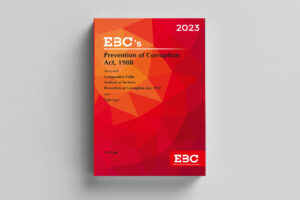Delhi High Court: In a criminal revision petition filed by the State assailing an order of the Trial Court wherein all accused persons were discharged for offences under the Prevention of Corruption Act, 1988 (‘PC Act’) due to inadmissibility of evidence as it was not accompanied by the certificate in terms of Section 65-B of the Evidence Act, 1872 in a sting operation conducted by news channel Aaj Tak showcasing an audio video recording of the assessing authorities and other officials of Sales Tax Department, Delhi accepting bribes in order to deal with the files. VIKAS MAHAJAN, J. remanded the matter back to the Trial Court, noting that certificate under Section 65-B of the Evidence Act, 1872 (‘Evidence Act’) can be filed subsequently with the supplementary charge sheet in support of the electronic evidence to ensure a fair trial without causing irreversible prejudice to the accused.
Background
The present petition revolves around the broadcast of “GHOOS MEHAL”, a program conducted by Aaj Tak, pursuant to a sting operation, which exposed authorities and other officials of Sales Tax Department, Delhi accepting bribes in order to deal with the files. This program , aired in March 2005, led to an FIR by Commissioner (Sales Tax), Delhi and subsequent legal proceedings involving 33 officials charged by the prosecution based on evidence from the sting.
However, the Trial Court initially ruled the evidence, including CDs and video cassettes, as inadmissible due to the lack of certification under Section 65-B of the Evidence Act. Additionally, the Trial Court held that the witness statements lacked specific details crucial for framing charges under the PC Act.
The prosecution persisted, asserting that evidence, including witness testimonies and documents, established a compelling case under Sections 7, 11, and 13 of the PC Act. They argued that the accused’s actions in the sting operation footage constituted clear instances of soliciting and accepting bribes, violating Sections 7 and 11, and abusing their positions for personal gain under Section 13.
Apart from the CD and Video Cassette, the material which was available to the Trial Court as part of the charge sheet, were the oral statements of the correspondent and camera person, respectively, who carried out the sting operation. The IO had not recorded the statement of any person, alleging demand of bribe by the persons captured in the videography. The Trial Court examined the witness statement and observed that he has made a bald declaration that officials of Sale Tax Department were openly and without any fear accepting illegal gratification and that he had taken a shoot of such Sale Tax Officials. Further, in the absence of names or identities of the persons accepting bribe, the Trial Court observed that in the absence of any evidence regarding demand of bribe, which is a sine qua non, the charge under Section 7 of the PC Act was not maintainable. Similarly, in the absence of any witness specifically naming and identifying the accused persons to have demanded and accepted bribe, it was held that even the charge under Section 13 of the PC Act cannot be framed. Hence the present criminal revision petition was filed before this Court against the order of the Trial Court.
Analysis and Decision
The Court examined the matter concerning the admissibility of a certificate pursuant to Section 65-B of the Evidence Act, which delineates the conditions under which electronic records can be accepted as evidence. Notably, the Court underscored the absence of a specific directive within the Act regarding the precise stage at which this certificate should be tendered before the Court.
Citing the precedent set forth in the case of Anvar P.V. v. P.K. Basheer, (2014) 10 SCC 473, the Court highlighted the obligation for a certificate to accompany electronic records such as CDs or VCDs to validate their admissibility as evidence. However, the subsequent ruling in the case of Arjun Panditrao Khotkar v. Kailash Kushanrao Gorantyal, (2020) 7 SCC 1 elucidated that the presentation of such a certificate could transpire at any juncture prior to the commencement of the trial proceedings.
In elucidating the significance of the certificate mandated by Section 65-B, the Court emphasized its indispensable role in substantiating electronic records as admissible evidence, thereby precluding oral testimony from serving as a substitute. While advocating for the pretrial filing of the certificate in criminal proceedings, the Court acknowledged the Trial Court’s discretionary power to entertain its submission later, provided it does not impinge upon the accused’s right to a fair trial.
In the specific context of the case at hand, the Court took cognizance of the prosecution’s submission of the certificate alongside a supplementary chargesheet antecedent to the formal initiation of the trial proceedings. Consequently, the Court deemed untenable the lower court’s ruling that nullified the evidentiary value of the CD and Video Cassette due to the certificate’s purported absence.
With regards to the certificate’s validity, the Court meticulously dissected Section 65-B and elucidated that the absence of a specific date on the certificate does not contravene its requisites. Furthermore, the Court expounded that the certificate’s issuance is not restricted to a particular individual but may be conferred by any responsible official or person vested with the authority to oversee relevant activities. The determination of the issuing individual’s compliance with these stipulations is a factual matter reserved for adjudication during the trial proceedings.
Having established the admissibility of a certificate filed subsequently with the supplementary chargesheet, the Court remanded the matter back to the Trial Court to frame fresh charges in accordance with law. Furthermore, the Court issued a directive for both parties to appear before the Special Judge on a designated date for further proceedings.
[State (NCT) of Delhi v. Karan Singh Yadav, 2024 SCC OnLine Del 3406, decided on 06.05.2024]
Advocates who appeared in this case :
Advocate for the State: Hemant Mehla, APP
Advocates for the Respondents: Ramesh Gupta, Sr. Adv, Bharat Sharma, Shailesh Kumar, Happy Chaubey, Rohit Yadav, Naina Kejriwal, Y. Goel, Ajay K. Sharma, Rupali Jha








